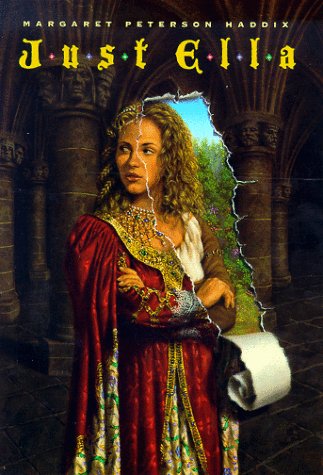
"Princess, nobody can stop those rumors. People would rather believe in fairy godmothers...than think that you took charge of your own destiny."Like every commoner in the land, Ella dreams of going to the ball and marrying Prince Charming. But after she is chosen to marry the prince, life with the royal family is not the "happily ever after" that Ella imagined. Pitiless and cold, the royals try to mold her into their vision of a princess. Ella's life becomes a meaningless schedule of protocol, which she fears she will never grasp. And Prince Charming's beautiful face hides a vacant soul.
Even as her life turns to misery, the stories persist that Ella's fairy godmother sent her to the ball: How else could the poor girl wear a beautiful gown, arrive in a coach, and dance in those glass slippers? But there is no fairy godmother to help Ella escape the deadening life of the castle. Can she do it on her own?
Margaret Peterson Haddix's reconstruction of the Cinderella legend without the magic -- how a commoner could have married the prince -- is a story as richly fascinating as the classic tale.
- ISBN10 0689821867
- ISBN13 9780689821868
- Publish Date 1 September 1999
- Publish Status Out of Stock
- Out of Print 2 September 2009
- Publish Country US
- Imprint Simon & Schuster
- Format Hardcover
- Pages 224
- Language English
Reviews


Amber (The Literary Phoenix)
Something to note: the cover rebranding for this book is a hot mess. The original cover (which I’ve used in this review) shows a medieval-garbed princess with a tearaway to reveal her in common garb. This tearaway affect so much better exemplifies the book and show Ella’s struggle. The rebranded version is a modern looking ballerina princess on a pastel cover and is so misleading to the content within. So I just want to put that out there – not so much a princesses and royals and pleasant fluff sort of book.
Just Ella was written in 1999 and acquired by me at the Scholastic Book Fair that same year. I was ten. This was a book about a princess who maybe didn’t actually want to be a princess and even at ten years old, I knew this was going to be a good read. I never liked the Cinderella story and how fairy godmothers and magic pumpkins turned her ugly into pretty and then the prince loved her so she didn’t have to be a slave to her step-mother anymore! And, apparently, Margaret Peterson Haddix wasn’t a fan either. Because there’s a whole lot of #nope in this book and even at ten years old, I was HERE FOR IT. And I still am now.
This novel is a middle grade novel. It’s written in simple language and doesn’t have a lot of rising and falling action. The plot is very simple. The romance is quick and baseless. Just Ella isn’t here to win awards for flowery prose. It’s here to say that women should be valued for more than just beauty. Beauty is a huge theme throughout the book as (spoilers!) it turns out Charm was only interested in Ella in the first place because she was beautiful and the prince needed to have beautiful children. She’s been brought into the palace basically as a broodmare for her DNA. So you know, great love story.
Honestly, for a MG novel, this is pretty heavy. There’s a point where Ella is locked up for going against the palace and the man given as her jailer is a convicted rapist who is told that he can “do whatever her wants” with her if she refuses to marry the prince. The prince himself physically forces Ella down on a couch and tells her to stay like she’s an animal. The abuse Ella receives at the hands of the palace, especially in the later chapters, is horrifying. Madame Bisset, her etiquette mistress, basically tells Ella that this is the price for an ascent to power.
Um, metaphors for real life anyone? How many women have opened up about this same type of experience in the last few years? Being graded for their appearance, told they are only good for one thing, told they can only move forward in life if they give a man what they want? Or have had men leer at them like they were less than a person. This book is dark in that it discusses topics that have plagued women for ages, and it’s not subtle. I don’t think I’ve ever seen the word “rape” used in a MG novel before. But these topics are important to discuss and the no-bells-and-whistles way Haddix does it is accessible to the intended audience as a red flag situation. These people are villains. This is not acceptable behavior.
So, I have mountains of respect for the important social stance Haddix chose to take in this novel, especially in a time where anything vaguely resembling a feminist book was difficult to find… particularly in the middle grade fantasy genre? That stuff has only taken off in the last decade. Or less. But beyond that aspect, if you’re boiling it down to its simplest terms, Just Ella is also a story about happiness, money, and social status. Young girls, and I felt this hardcore in my generation, are wired to expect a Disney Princess happily ever after. Blame the rom coms that were so popular as we were growing up. We were taught that our lives were given value when a boy told us we were pretty and we wanted big weddings and pretty dresses, and to have lots of money and to be loved by a socially significant person. Like a doctor or a lawyer. Or a prince. And this book dares to say, “Listen. That material stuff? It’s bullshit. Find a person who you like, who you love, who you can talk to, and who makes you happy. Your physical appearance should be moot. Your social status should not matter. If you want a happily ever after, physical and material things won’t get you there.” There is also a few things at the end – like no saying “yes” immediately because #goals do not need to be “oh thank goodness I’m engaged, I have value as a person now!” and a partner who is respectful of your wishes. Also the ability to love another person but for each person to have their own separate identity outside the relationship?
There are so many things I like about the message in this book.
It has its gritty parts. There are a lot of scary things happening at the palace, but I am so proud of Ella coming to her own and saying the things she says. Honestly, this book has stayed with me for twenty years because it was so important in my formative years to hear these things being said in a world that was positively screaming the opposite. The writing itself is simple and easy, but the message is deeply important and I am so happy Haddix have the gumption to say it two decades ago when almost nobody else was.
So, from a mechanical perspective, Just Ella is very much written for MG readers. It’s not a challenging book. It’s not a deep book. It’s not even a particularly nice book. But. It is a good book with important things to remind young girls. The world is a horrible, scary place. Find people you can trust, and always remember that you have value.
